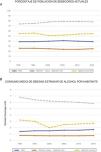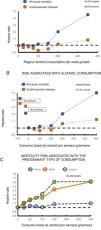Recent epidemiological studies have shown that alcohol consumption can increase the risk of arterial hypertension, atrial fibrillation and gastrointestinal and breast cancer. Various sectors are therefore promoting abstinence from alcohol. However, light alcohol consumption has once again been shown to reduce the risk of myocardial infarction and diabetes but with an unclear effect on cerebrovascular disease. The decision to consume alcohol should therefore be an individual one based on personal factors. A level of consumption <100 g/week for men (less for women) appears not to increase all-cause mortality, while high consumption or binge drinking significantly increases mortality risk. All measures to prevent this type of consumption, especially among the younger population, should therefore be applied. There are data indicating an advantage of wine over other beverages, but they are not conclusive.
Estudios epidemiológicos recientes han demostrado que el consumo de alcohol puede aumentar el riesgo de hipertensión arterial, fibrilación auricular y de cáncer digestivo y de mama, por lo que diversos estamentos están promoviendo la abstinencia. Sin embargo, también han vuelto a confirmar que el consumo ligero de alcohol puede reducir el riesgo de infarto de miocardio y de diabetes, no quedando claro el efecto en la enfermedad cerebrovascular. Por ello, la decisión del consumo de alcohol debe ser individual y basada en factores personales. Un nivel de consumo <100 gr/semana en hombres (menor en mujeres), parece que no aumenta la mortalidad por cualquier causa, mientras que consumos elevados o en forma de atracón (“binge”), incrementan significativamente el riesgo de mortalidad, por lo cual deben aplicarse todas las medidas para prevenir este tipo de consumo, especialmente en la población más joven. Hay datos que apuntan una ventaja del vino frente a las otras bebidas pero no son concluyentes.
Article
Diríjase desde aquí a la web de la >>>FESEMI<<< e inicie sesión mediante el formulario que se encuentra en la barra superior, pulsando sobre el candado.

Una vez autentificado, en la misma web de FESEMI, en el menú superior, elija la opción deseada.

>>>FESEMI<<<













